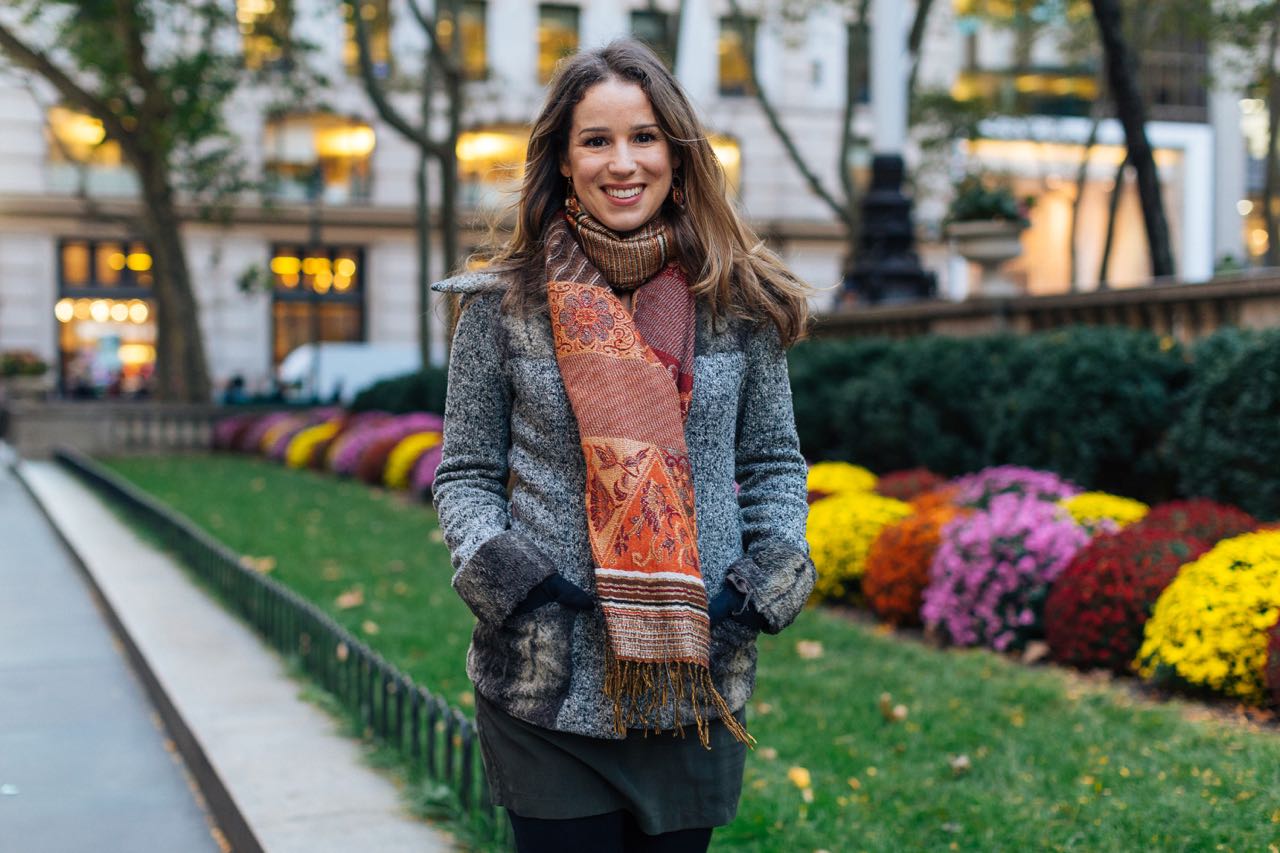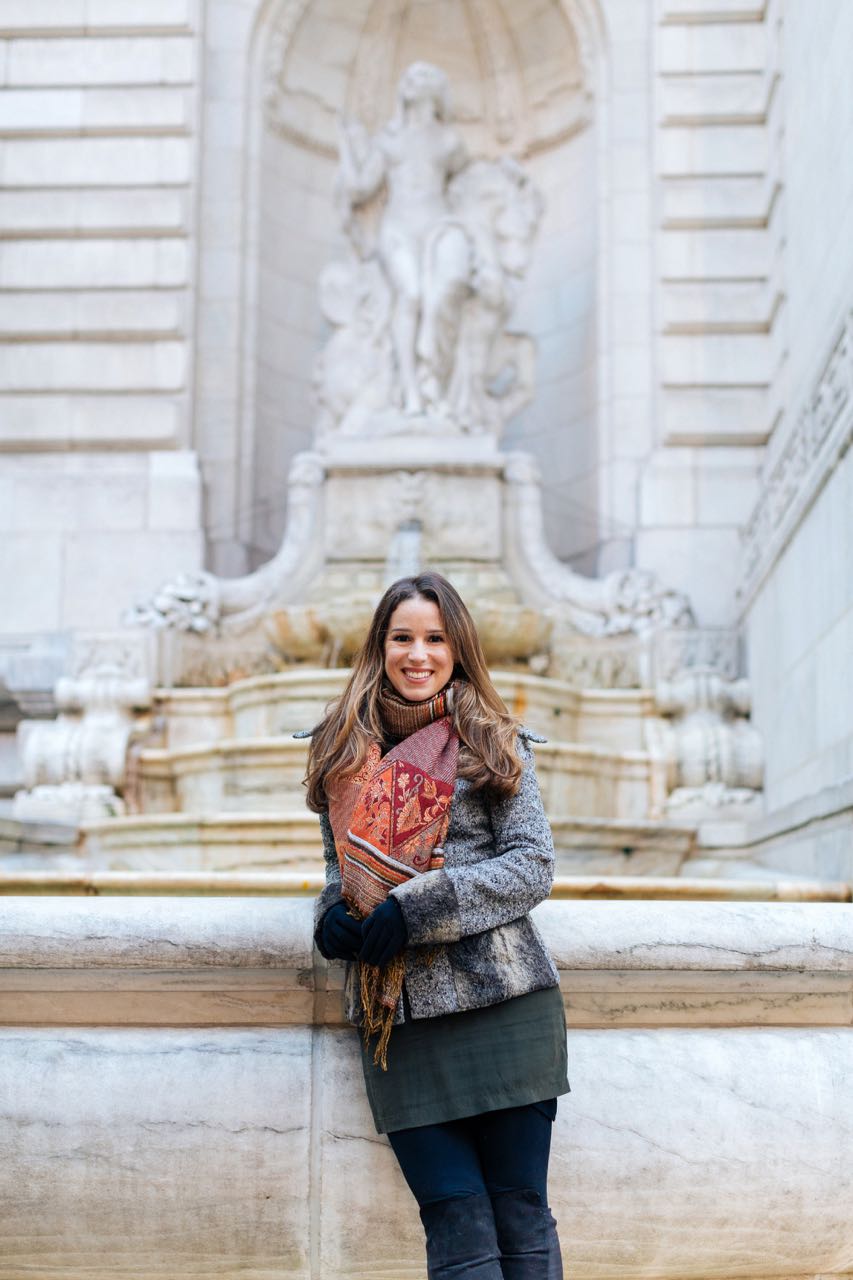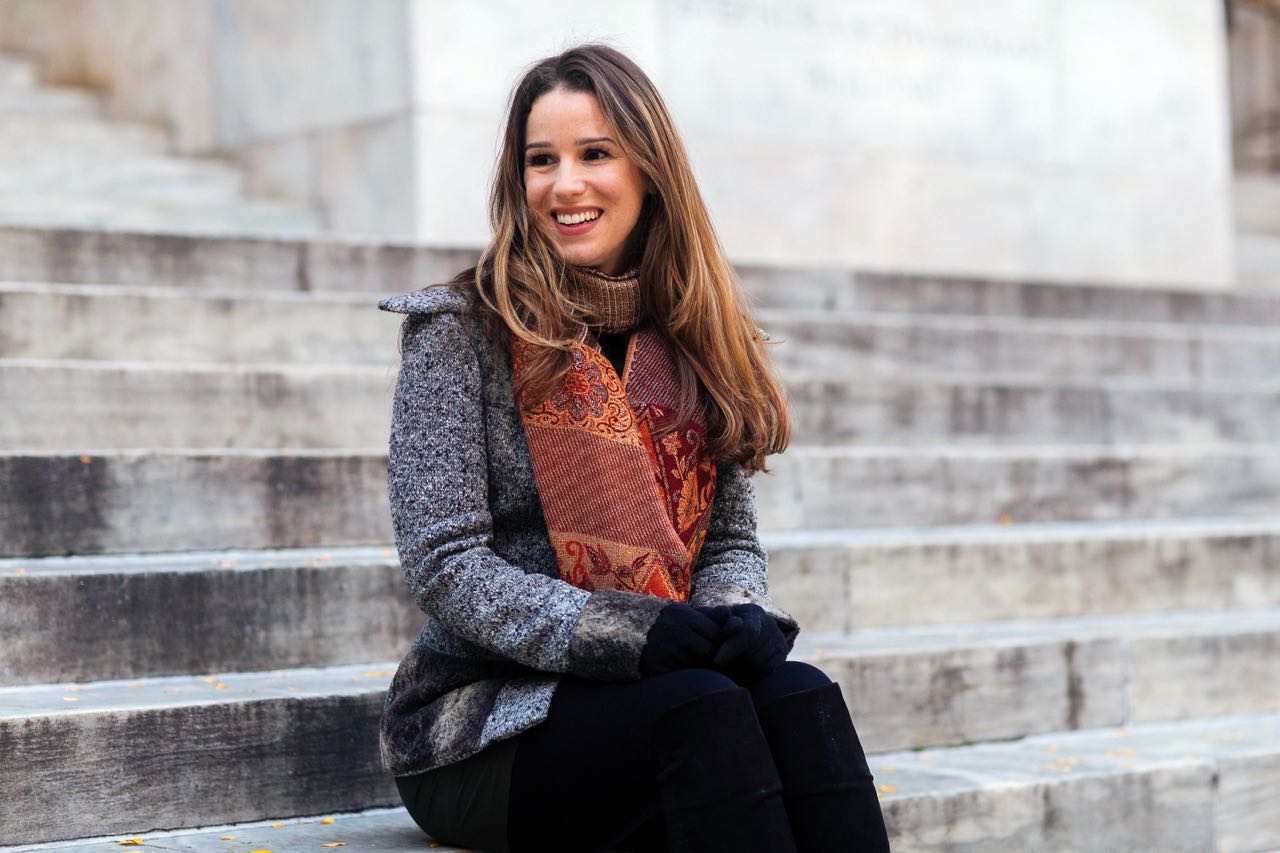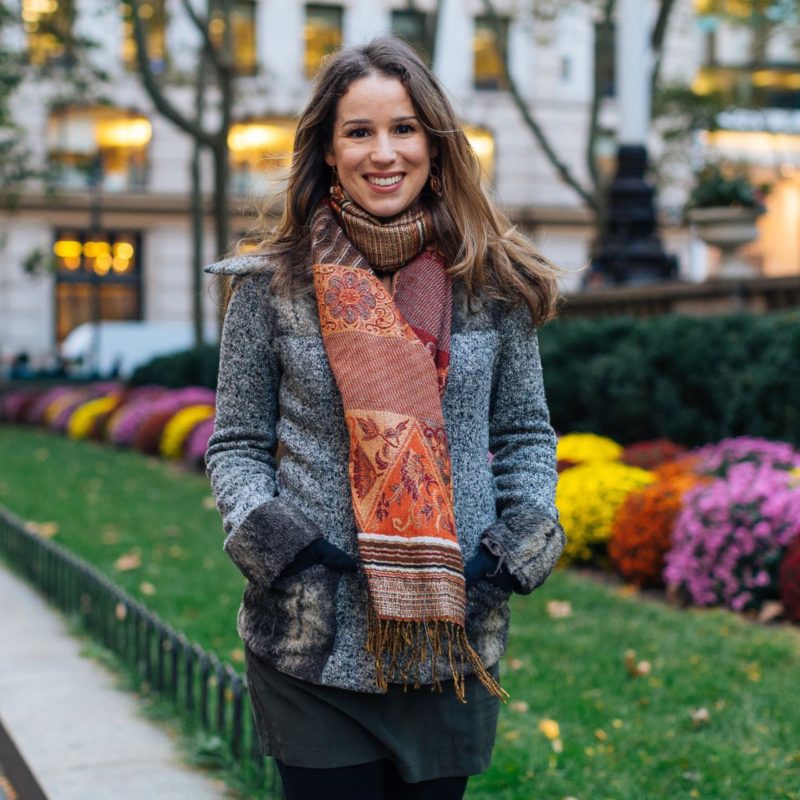An Interview with Chilina Kennedy

Written by Victoria Myers
Photography by Melodie Jeng
November 29th 2016
One of the under appreciated aspects of performing on Broadway is the challenge of taking over a lead role in a popular, long running Broadway show. Chilina Kennedy knows that challenge well. Since spring of 2015, she’s been playing Carole King in Beautiful: The Carole King Musical. Prior to that, she was seen on Broadway in Jesus Christ Superstar and has performed multiple times at both the Stratford and Shaw Festivals in her native Canada. In October, we sat down with her to discuss doing a long run of a show, what other areas of culture affect her work, and more.
You’ve been in Beautiful for awhile. Have you found that how you get ready for a show changes?
Well, the only thing that has changed a little bit is that it takes me a little bit less time now to do my hair, to do my prep and all that kind of stuff because I’m so used to it, but the way that I get into it in terms of my actor’s preparation is the same. It’s always been the same. I don’t mean the same in terms of what I do, but in terms of the processes. I need to warm up my voice. I need to listen to the music to get me into the vibe of the show, of the music of that era, whatever I need to do that day. I do breathing. I do a physical warm up. Just stuff that kind of gets you ready to get going on the deck.
When you’re playing a real person, is it more challenging to change things as the run has goes on?
I just threw in a few new things the other day. You don’t mess up your fellow actors, but you should be able to sort of grow and be alive with the part. It’s going to deepen. The longer you do something the more it’s going to sink in and the more stuff you are going to find—and also because our Jerry has changed. Now we have Jake [Epstein] back again, so that changes the entire show for me. Having a different Jerry is like having a different husband every night. It’s going to change significantly. I do find that things change. On the inside it feels like it changed dramatically, but probably from the audience perspective it hasn’t changed too much, but it keeps it exciting and fresh, and the more we are willing to play, the more exciting it makes it for the other actors as well. It gives them new things to sort of bounce off of and it just keeps it alive and buoyant and fun.
What’s your acting process like, in general? Did you find that you had to change it at all because you were going to a show that was obviously very well known and had the added layer of playing a real person?
The first thing is trying to take the pressure off myself. I think there’s always pressure when you are playing somebody who’s alive and who everybody looks up to so much. The way that people do with Carole King. It’s the same thing when you play somebody like Evita or parts that are really well known. People have visceral reactions to people who played them before, like Patti LuPone, who is so famous for playing certain characters, and anyone who tries to touch those characters after her, it’s going to be tricky. And it’s like that. Obviously the way that Jessie [Mueller] played it was wonderful. I loved her version of Carole and I think everybody else did too, so there was that pressure and the pressure that everybody loves her so much and they kind of expect a certain thing when they come to see the show, so that is a big thing that you kind of have to push aside and do a lot of work to try to forget that. I really try to let the character breathe through me and try not to put too many judgements or expectations on what I’m doing and just to allow myself to really be there and be in the moment. When I was at Stratford, we did a lot of breath coaching.
What’s breath coaching?
Basically you work on how the character breathes and how you breathe, and letting things in from the inside out—not just thoughts, but your whole body encompassing this person that you are playing. It’s just a different way or working. Every character breathes differently and every person breathes differently. It’s just a very inside out way of working. You work with a coach and they kind of feel what’s going on with you and you kind of work out kinks inside your own body to get to a neutral place so you can put something else in. You’ve kind of got to get rid of your own stuff and then make room for the stuff that is your character. It just takes a lot of pruning and a lot of work and a lot focused attention on what’s going on in the inside of you because you don’t want to take things onto the stage. You don’t want to take your own personal experiences. You have to be able to draw on your own personal feelings, but you don’t want to bring your marriage or your kids or your likes or dislikes into the show, or your biases. You have to be able to get rid of that stuff to be able to think and feel the way the character does. It sounds really crazy, but that to me is really, really helpful, especially with Carole. When you watch these old videos of her in ‘70s, she’s got a very particular way of interacting with other people and with the piano and she’s got a physicality that’s unique, and the way that she uses her hands. You don’t want that to be something that you’re putting on, you want it to come from the inside out, so things like thinking about those tiny little details really help.

How do you start to layer in the physicality, especially in this case where there’s video and all this stuff and it’s very specific?
You don’t want it to be like a Saturday Night Live sketch of the person. It has to be real. I always think of it like a rainbow. That sounds so cheesy, but if it’s like a rainbow of personality, and if I’m red and Carole’s yellow, my version of her will be somewhere in-between. It will be an orange. So it’s not going to be one or the other. It’ll be something that’s kind of a different. I think it’s just about finding out why they do what they do. Why does she stand that way? What are the cultural differences? What are the parental influences? What are the musical influences? And trying to do as much research and study and watching her videos really, really helped me because I started to see sort of patterns, and then I just kind of tried putting it on, but really gently and delicately. Not with broad brush strokes, but with fine kind of detail brush strokes, and then I tried to find the way that those things responded inside of me in a natural way, in a way that I could connect with them as me.
Are you visual?
I am very visual, yeah. I love to draw. I used to love to draw and paint a lot. I don’t do it anymore nearly as much, but I did a lot of imaging too. David Latham at Stratford taught us imaging when I did the conservatory for classical theatre at Stratford. Basically what you do is you take a chunk of text, just a little like one partial line or one tiny thought and you close your eyes and you come up with an image. What is a powerful image is whatever image comes up for you. It can be completely unrelated to what it is, but the first thing that comes up you are supposed to kind of stick with that and really let it sink into your entire body, and then when you are ready you open your eyes and you speak from the place of the image, and that way it really locks down the show in big kind of colorful thoughts and images for you. In long runs when you’re looking for inspiration and you’re kind of wanting things to be fresh, you can always go back to those images or do it again with different images. It’s a really nice way to kind of, in a physical way and imaginatively jump into a role.
What other areas of cultural influence your work?
I love indie films. I love indie music. I love all different kinds of music. I just took a vacation. I drove down to Georgia for a friend’s wedding, but I stopped for three days for a yoga retreat. It was amazing because all the way down I didn’t have anybody to keep me company. It was just me, and I listened to the radio and it was such an education driving by myself and listening to what was on and going to that space, basically a silent yoga retreat with no television, no nothing. I love the silence, I love yoga, I love meditation. I love to go and be exposed to certain music that maybe I would never listen to. I always think that listening to the radio is kind of an education for me because there are certain things that I love that I would stick to, but if you turn on the radio, you’re kind of forced to open your mind to other styles maybe that you wouldn’t normally listen to. And I love art. I love going to an art gallery and just spending a day. I haven’t done it in a long time, but I love just sitting there and staring at the paintings. My old voice teacher actually said to me that everything should influence your art. If you go see a wonderful ballet, that should inform your performance that night. If you have a wonderful talk with somebody, that should be able to infuse your performance with whatever that brought to your life that day. Or if you had a great walk in the park with your baby, you can bring that to your work. All of it can influence your work. It just depends on how you look at it. It depends on your perspective.

And you have an album too.
It’s so interesting being here in New York. The indie music scene in Canada is so very different than the music scene in the States. I’d been writing all these tunes for about ten years that I put in an album, and they reflected very much what I was listening to in that sort of ten year period of my life. It is very much over now, especially since I’ve been here, so that album kind of reflects a certain thing and now I’m working on different material and collaborating with a bunch of different people, and it’s so interesting to see what comes out of that, and being in this culture now and seeing how that sort of affects writing and what I’m listening to and how I respond to music. It’s fascinating.
What do you find yourself responding to now?
When you’re sort of in the indie scene in Canada, there’s this kind of cool factor, like you can only listen to this type of music and that’s the only way to be cool. I think that I’ve gotten out of that kind of judgmental mindframe. It should be about listening to what you love and you don’t have to make apologies for that. You can just own that. I’m more open-minded to the mainstream [now] and listening less to Canadian music and more to American music and just kind of being as influenced as I can be by all of them.
That plays into one of the things I ask actors a lot that has to do with how you manage to still develop as an artist in an industry that’s into typecasting.
Well, I think the worst thing that we do is we typecast ourselves too. I fight against it all the time. I have for years, but I’ve been lucky. I’ve got to work in places like Stratford where I’ve played roles that I never thought I would do; they tend to let you exercise that actor muscle because you’re in a company and you get to play at least two characters a season, if not more. Even for Carole I’ve certainly felt the connection with the part, but I didn’t necessarily know that other people would think it was the fit that I felt it was. You just kind of have to not worry about it too much. As soon as we start thinking about what others think about us too much, you get lost in that idea of yourself and then you stop being truly in your own body and in your own spirit. I used to get really nervous for auditions and things like that, but I think when you start to understand why you’re getting nervous, and if your goal becomes less about impressing and more of just doing the work, then I think there’s less reason to get nervous. I don’t know if I’m right for that role. Let them decide and I’ll just worry about connecting with the material and then they can make the decision. I mean it’s always out of our hands anyway. We think we have control. We have no control. We never do, unless you are the one casting the show.
Do you have a dream idea of what you want to do next?
I have so many. Oh my God. Honest to God, every role that I’ve never played I want to do at some point. I know that you can’t do it all, but I love my job. I love where I’m at and I’m excited to just to continue investing in this role. I’m applying for my Green Card right now, so every single extra second has been spent doing that, but when that’s done my goal is to go and see every show on Broadway that I haven’t seen yet because we have Wednesday nights off. And when I’ve done with that, I have a lot of writing that I want to do. I’ve got a second album that I’m working on and I’ve got some other projects that I want to see getting off the ground. I’m very interested in exploring the arts and exploring the music scene on a much deeper level in New York and going to see live music as often as I can, because I want to be able to dive in and see as much as I can while I’m here. There’s a ton of parts I want to play. Guinevere [in Camelot] has always been a big one. Tennessee Williams, Shakespeare, there are so many wonderful plays, there’s so many wonderful musicals. Musicals that haven’t been written yet. Musicals that I would like to create too.
In addition to the album, are you interested in playwriting, as well?
I am. I have not done a lot of it at all, but I would love to collaborate with some people because I’ve got a lot of ideas. It’s just a matter of wrapping up time to actually get it done.
Do you find that that’s something that people have been open to and encouraging of?
Absolutely. This sounds cheesy, and maybe it’s not entirely realistic, but I think if you’re going down a path and everyone’s telling you no, then stop surrounding yourself with those people. Find a path where people are telling you yes, and that’s probably the path that you should be on. It’s the same with thing with parts. I just find that the best things in life kind of happen because they are meant to be, and usually you have people who can see that because if it happens, it’s because of people’s belief and it’s also something that should happen. It’s not that I don’t think that you shouldn’t fight if people are telling you no. But I think if you’re getting a lot of negative energy, then maybe that’s your clue to turn around and find where the support is and then look for that.

